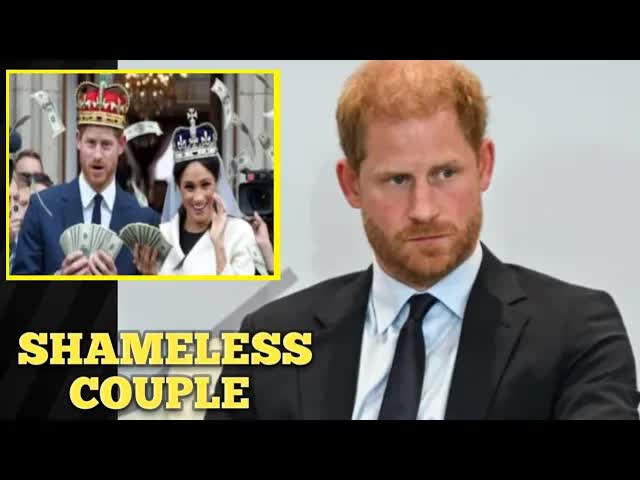The News
The Royal Dilemma: Meghan and Harry’s Title Controversy Sparks Debate
In recent weeks, the spotlight has once again turned to Meghan Markle and Prince Harry, igniting a fierce debate over their use of royal titles.
Once seen as the modern face of the British monarchy, the couple has faced relentless scrutiny since stepping back from their royal duties in 2020.
Their latest documentary has only intensified discussions around the implications of using their royal titles for commercial gain.
After their departure from royal life, Meghan and Harry sought a fresh start in North America, aiming for independence from the royal family.
However, this transition has not been smooth sailing.
They have faced significant backlash, particularly regarding their continued identification as the Duke and Duchess of Sussex.
Critics argue that by maintaining these titles, they are exploiting their royal status to bolster their brand, raising ethical questions about their actions.
In their documentary, the couple opens up about the mental health challenges they encountered while navigating royal life, as well as the unrelenting media scrutiny.
While many viewers appreciate their honesty, others feel conflicted.
The question looms large: does their commercial use of royal titles betray the very institution they distanced themselves from?
Meghan and Harry have embarked on various ambitious projects, including lucrative deals with streaming platforms and book publications.
Critics contend that these ventures capitalize on their royal heritage, diminishing the dignity associated with their titles.
Public opinion remains split; supporters argue that the couple deserves to profit from their experiences and the platforms that come with their royal status.
They point to Meghan and Harry's commitment to charitable causes and mental health advocacy as evidence of their positive impact.
Conversely, detractors view their actions as a blatant exploitation of privilege.
They argue that by holding onto their royal titles while pursuing commercial interests, the couple is straddling two worlds, reaping the benefits of royal association without embracing the responsibilities tied to it.
This duality raises significant ethical concerns.
Adding to the complexity is the royal family's response—or lack thereof.
Traditionally, royals have maintained a certain distance from commercial endeavors, with the Queen famously adhering to the principle of “never complain, never explain.”
However, Meghan and Harry's actions seem to challenge this longstanding tradition, prompting discussions about how the monarchy should evolve in the modern age.
As viewers watch the documentary unfold, they witness the couple grappling with their identities outside the royal bubble.
They share the emotional toll that intense public scrutiny took on their mental health, particularly highlighting the media's often harsh treatment of Meghan.
This narrative humanizes them, inviting empathy from audiences who might otherwise be quick to judge their choices.
Yet, the intertwining of their personal and professional lives complicates matters.
Questions arise about authenticity and whether the couple is genuinely advocating for change or merely seeking financial gain.
The documentary leaves much ambiguity, forcing viewers to confront their conflicting feelings about Meghan and Harry's motivations.
The ramifications of their actions extend beyond their personal circumstances.
The couple's decisions have sparked broader discussions about the monarchy's role in contemporary society.
As public figures navigate the complexities of fame and responsibility, Meghan and Harry's situation serves as a case study for future generations of royals.
Are the lines between personal branding and royal duty becoming increasingly blurred?
Criticism surrounding Meghan and Harry's use of their royal titles has become a focal point of public discourse.
Many believe that retaining their titles while pursuing profitable business ventures undermines the values the British royal family represents.
These titles carry a significant weight of responsibility, and critics argue that the couple is abandoning that duty for personal gain.
Moreover, the media coverage of their actions has significantly shaped public perception.
Many tabloids frame Meghan and Harry's decisions as hypocritical, suggesting that while they criticize the invasive nature of the media, they simultaneously engage with it for their benefit.
This perceived hypocrisy fuels skepticism about their commitment to the causes they champion, such as mental health awareness and social justice.
Finally, the backlash against Meghan and Harry's title usage often intersects with larger societal issues, including race and gender dynamics.
Meghan, being a biracial woman, faces unique challenges that color public perceptions of her actions.
This complexity adds depth to the conversation, as discussions about their royal titles become intertwined with questions of representation and equity.
As this saga continues to unfold, it prompts vital conversations about the monarchy's future and the responsibilities that come with privilege.
Meghan and Harry's journey reflects changing societal values and the evolving landscape of fame.
Whether viewed as pioneers or opportunists, one thing is clear: the couple has undeniably reshaped the narrative surrounding royalty and celebrity in the modern world.






























































